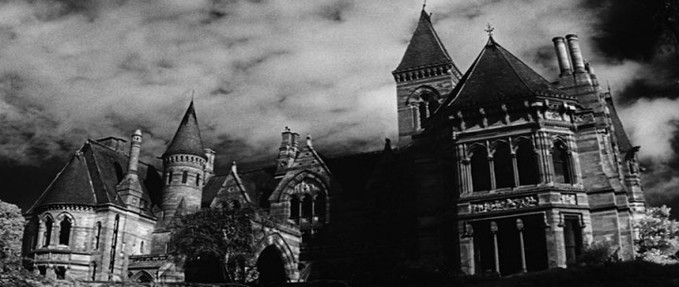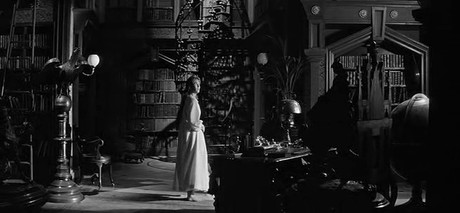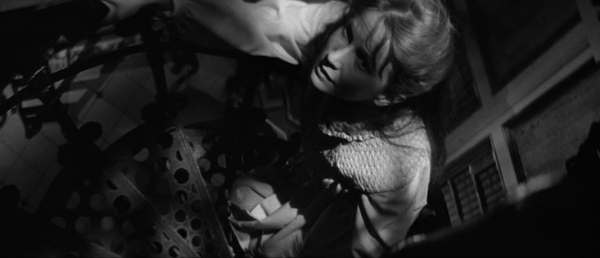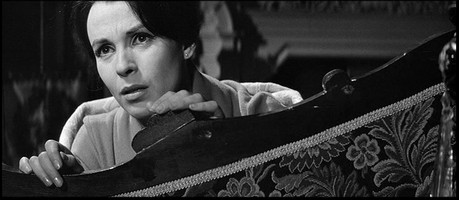Hey guys! Horrorella here...
Happy Halloween! This week, I'm looking at a much loved but often overlooked horror classic. Based on Shirley Jackson's novel The Haunting of Hill House, and released in 1963, THE HAUNTING is a fascinating horror film, and one that has grown to be a loved and respected classic over the years.
Directed by Robert Wise, and written by Nelson Gidding, the film opens with a voiceover by Dr. John Markway (Richard Johnson), introducing Hill House and describing its ghastly history. Markway is an anthropologist with a keen interest in the paranormal. He has selected Hill House as the location for a new experiment - one that he hopes will help to prove the existence of the supernatural. To aid in his work, he invites three strangers to join him at the house and to act as assistants, documenting any strange phenomena they might witness - Eleanor (Nell, played by Julie Harris) and Theodora (Theo, played by Claire Bloom), and Luke (Russ Tamblyn), heir to the current owner, who hopes to one day sell the property off, as it has stood empty for years.
The story opens with Nell venturing away from her home and her life, which, until this point, has been eventless. She has spent most of adult life caring for her sick mother, who finally passed away two months ago. Nell is enjoying her first moments of freedom, and her wide-eyed innocence is contagious. She is tremendously excited - not only for the opportunity to leave home and go somewhere else, but for the opportunity to finally belong somewhere to and to be accepted as a part of a group. She has been incredibly sheltered and shouldered with thankless work, and is thrilled to finally be doing something for herself.
When she arrives at the mansion, it is with a mixture of excitement and unease. Though opulent and luxurious, Hill House is intimidating; the exterior positively glowers at anyone approaching (Wise achieved some fantastically creepy shots through the use of an infrared camera). Once inside, long hallways, oddly constructed rooms and a labyrinthine interior all contribute to a claustrophobic, isolated atmosphere. Though beautiful and extravagant, there is nothing welcoming or inviting about Hill House. It sits poised, as if ready to strike at any moment.

The group begins to settle in, though it isn't long before strange occurrences begin to shake their constitution. Cold spots, strange noises, and odd feelings abound. The very first night, Nell and Theo are accosted in their rooms by loud, oppressive banging in the hallways outside their doors – the notable presence of an unseen force trying to enter. In the daylight, it is easy to laugh off, but during the moment, it is absolutely terrifying. It quickly becomes clear that there is a mysterious entity making itself known within the walls of Hill House, but what exactly it is remains as shadowy as its motives.
The terror in THE HAUNTING lies in just how little it actually shows. Wise had intended it to be something of a tribute to his mentor, producer Val Lewton. That influence is certainly apparent in this film, which relies heavily on the unseen to tell its story and to instill fear in both the characters and in the audience. It is a highly effective method. The only thing more frightening than seeing what is on the other side of the door to Nell’s room is what we can imagine to be on the other side of the door to Nell’s room. The idea that the monster we create in our minds is much more terrifying than anything that can be projected onscreen. . If you have ever lain awake in bed wondering just what that strange sound could possibly be, but are too frightened to do anything but bury your head under the covers, you know exactly what I’m talking about. This film taps into that fear. The fear of the unseen and the unknown coming into close proximity, and you being helpless to stop it.
The strange and unworldly interior of Hill House is made all the more frightening when everything is cast into darkness and shadows hover on the walls. The labyrinthine hallways become all the more oppressive and maze-like once night falls and changes the appearance of everything around the characters. The feelings of isolation grow stronger as we, like them, begin to feel more and more exposed, and at the mercy of whatever might be hiding in those darkened corners.

An interesting component of the film is the marriage between the supernatural and the psychological. When screenwriter Nelson Gidding was adapting Jackson’s novel, he envisioned the entire story to be the hallucination of a woman in an insane asylum. He met with Jackson, who told him that the story was, in fact centered on a supernatural phenomenon, so he adapted his script accordingly. But the psychological component revolving around Nell’s fragile state of mind is still present in the finished film, though not as pronounced as Gidding had originally intended. It is clear when watching the film that something otherworldly is definitely present within the halls of Hill House, but the story also employs a healthy amount of psychological tension.
This is exemplified primarily in Nell’s development over the course of the film. When she first arrives at Hill House, she finds it off-putting. The intimidating interior and the ghostly tales surrounding it do little to put her at ease, and she feels frightened and unsettled. When ghostly writing appears on the wall, stating "Help, Eleanor, Come Home," she is terrified that whatever entity living in the house not only is aware of her presence, but also knows her name. She feels that the house has singled her out and chosen her for something, a thought that terrifies her.
But as time goes on, she gradually comes to accept and believe that she is to play an important role here; that the house has chosen her. She feels she belongs here. For the first time in her life, she has found a place that is hers, a place she can call home. She has no desire to leave, and feels the house is calling her to join with it forever.
What is unclear, is whether or not these feelings are coming from the influence of a supernatural entity, or are part of Nell's fraying state of mind. She gradually becomes more and more unstable as the story goes on, and it is unclear to the audience if these feelings are the result of her rapidly unraveling psyche, or if something more sinister is pulling the strings and guiding Nell and her behavior. The two aspects are both at play here, working cooperatively to create doubt and unease in the minds of the audience.
Enhancing this is the fact that the nature of the supernatural phenomena is kept very vague throughout the film. This is a ghost story with no real rules. We don’t know what or who haunts the halls and grounds of Hill House. There is no story dictating that at midnight each night, the lost soul of whoever goes roaming the property, or anything like that, giving the story specific parameters. The house's history is simply that several people have died here under strange circumstances, and strange happenings can now be observed throughout its grounds We don’t know what or who is supposedly responsible for them. It is simply creepy stuff happening in a creepy house, which is fantastically disturbing, because it adds to the fear of the unknown.

The performances really help to sell the film, particularity Julie Harris' portrayal of Nell. The character goes through quite a range of emotions, from the excitement she feels at the beginning of the story to the terror that she feels as the phenomena begin to be more pronounced. The character is fragile from start to finish, in varying degrees, but it is only toward the end that we really begin to notice the cracks in Nell's psyche. The vulnerability that has been so endearing throughout the film is now something of a hazard, as we begin to fear for Nell's mental state.
Claire Bloom provides a nice balance to Nell in her portrayal of Theo. The character has an acerbic wit about her that comes into play at several points, generally when Nell is succumbing to the terror she perceives around her. Theo is happy to jump in with a prodding, almost caustic humor to defuse the moment and ground Nell once more, and Bloom plays this side of her personality perfectly. Also interesting is the character's sexuality, which Jackson's novel hints at, but is fairly pronounced in the film. The portrayal is notable, particularly given the time frame, due to the fact that the character is portrayed so positively. In a time when queer characters with either played for laughs, or in the case of lesbian characters in particular, predatory, having a gay character onscreen in a more positive role is a welcome addition.

THE HAUNTING initially opened to mixed reviews, but has since gone on to be revered as one of the classic horror films of the era, and still an affecting one even today. Sitting in a darkened room with the volume cranked up, it’s impossible to not dive under your blanket when whatever lies within the halls of Hill House begins making its presence known through loud knocks and handless turning of doorknobs. Because it could be anything hiding out there in the dark. The monsters from the darkest reaches of your imagination, lying in wait.
Thanks again for joining me - this has been a fun project for me, and I hope you have enjoyed discovering or revising these classics too. I've had so much fun, in fact, that I think I'm going to keep it going. Not as frequenly, but once or twice a month it would be fun to catch up with some other older, overlooked horror classics. So if you have any favorites that you would like to see or think I should check out, definitley let me know!
Happy Halloween!!!
